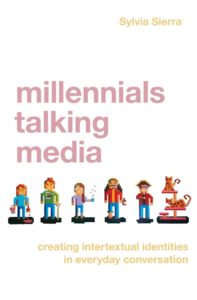From Professor and Chair of the Department of English and Linguistics Gary Richards:

2009 UMW alumna Sylvia Sierra is an assistant professor in the Department of Communication and Rhetorical Studies at Syracuse University
Congratulations to alumna Sylvia Sierra ’09! She has written the book Millennials Talking Media: Creating Intertextual Identities in Everyday Conversation, scheduled for release from Oxford University Press in September 2021.
Sierra is currently an assistant professor in the Department of Communication and Rhetorical Studies at Syracuse University. She completed her Ph.D. in the Department of Linguistics at Georgetown University in 2016. Previously, she received a B.A. in Linguistics and Spanish from the University of Mary Washington where she graduated summa cum laude, and worked as a Fulbright English Teaching Assistant at the Instituto Tecnológico de Jiquilpan in Michoacán, Mexico and then as a Prince William County Spanish teacher in Virginia. She also holds a Master of Education (M.Ed.) in Teaching English as a Second Language from UMW and an M.S. in linguistics from Georgetown.
In the new book, Sierra analyzes how millennial friends make intertextual media references (to film, TV shows, books, songs, video games, and internet memes) in their everyday talk for specific interactional functions.
 “This book examines how a group of U.S. Millennial friends in their late twenties embed both old media (books, songs, films, TV shows) and new media (YouTube videos, video games, and internet memes) in their everyday talk for particular interactional purposes. Multiple case studies are presented featuring the recorded talk of Millennial friends to demonstrate how and why these speakers make media references in their conversations. These recorded conversations are supplemented with participant playback interviews, along with ethnographic field notes. The analysis demonstrates how the speakers phonetically signal media references in the speech stream, how they demonstrate appreciation of the references in their listening behaviors, and how they ultimately use media references for epistemic, framing, and identity construction purposes, often (but not always) when faced with epistemic, or knowledge, imbalances as well as interactional dilemmas, or awkward moments in interaction. The analysis shows how such references contribute to epistemic management and frame shifts in conversation, which is ultimately conducive to different forms of Millennial identity construction. Additionally, this book explores the stereotypes embedded in the media that these Millennials quote, and examines the effects of reproducing those stereotypes in everyday social life. This book explores how the boundaries between screens, online and offline life, language, and identity are porous for Millennials, and weaves together the most current linguistic theories regarding knowledge, framing, and identity work in everyday interaction, illuminating the interplay between these processes.”
“This book examines how a group of U.S. Millennial friends in their late twenties embed both old media (books, songs, films, TV shows) and new media (YouTube videos, video games, and internet memes) in their everyday talk for particular interactional purposes. Multiple case studies are presented featuring the recorded talk of Millennial friends to demonstrate how and why these speakers make media references in their conversations. These recorded conversations are supplemented with participant playback interviews, along with ethnographic field notes. The analysis demonstrates how the speakers phonetically signal media references in the speech stream, how they demonstrate appreciation of the references in their listening behaviors, and how they ultimately use media references for epistemic, framing, and identity construction purposes, often (but not always) when faced with epistemic, or knowledge, imbalances as well as interactional dilemmas, or awkward moments in interaction. The analysis shows how such references contribute to epistemic management and frame shifts in conversation, which is ultimately conducive to different forms of Millennial identity construction. Additionally, this book explores the stereotypes embedded in the media that these Millennials quote, and examines the effects of reproducing those stereotypes in everyday social life. This book explores how the boundaries between screens, online and offline life, language, and identity are porous for Millennials, and weaves together the most current linguistic theories regarding knowledge, framing, and identity work in everyday interaction, illuminating the interplay between these processes.”For more on the book and Sierra, see https://www.facebook.com/millennialstalkingmedia and sylviasierra.com as well as: instagram @millennialstalkingmedia, twitter @milltalkmedia, and tiktok @millennialstalkingmedia.